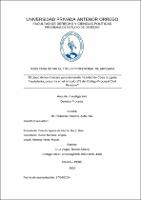Mostrar el registro sencillo del ítem
El plazo de los 6 meses para demandar Nulidad de Cosa Juzgada fraudulenta, prescrita en el artículo 178 del Código Procesal Civil Peruano
| dc.contributor.advisor | Cruz Vegas, Ruben Alfredo | |
| dc.contributor.author | Requena Palacios, Aída Rita | |
| dc.creator | Requena Palacios, Aída Rita | |
| dc.date.accessioned | 2024-05-02T22:43:36Z | |
| dc.date.available | 2024-05-02T22:43:36Z | |
| dc.date.issued | 2024 | |
| dc.identifier.uri | https://hdl.handle.net/20.500.12759/27753 | |
| dc.description.abstract | A la presente investigación se le ha titulado “El plazo de los 6 meses para demandar nulidad de cosa juzgada fraudulenta, prescrita en el artículo 178 del Código Procesal Civil peruano”, para ello se ha partido de la siguiente pregunta de investigación: ¿Por qué el plazo de los 6 meses para demandar nulidad de cosa juzgada fraudulenta atenta contra la funcionalidad de este instituto procesal? Ahora, para poder realizar nuestro estudio, ha resultado pertinente plantearnos el siguiente objetivo general: “Dar a conocer que el plazo de los 6 meses para demandar nulidad de cosa juzgada fraudulenta atenta contra la funcionalidad de este instituto procesal”. Para poder llegar al objetivo propuesto, ha sido imprescindible fijarnos los siguientes objetivos específicos: 1. Analizar la institución de la nulidad en la cosa juzgada fraudulenta en el derecho peruano y en el derecho comparado; 2. Indicar que el plazo de 6 meses contemplado por artículo 178 del Código Procesal Civil peruano, constituye una incongruencia con la finalidad de la nulidad de la cosa juzgada fraudulenta; y, 3. Proponer la derogación del plazo de 6 meses del artículo 178 del Código Procesal Civil Peruano a efectos de tener una regulación más adecuada. Finalmente, después del estudio realizado, se ha llegado a plantear la siguiente conclusión general: “La determinación del momento inicial para computar el plazo inicial de los 6 meses para demandar la nulidad de cosa juzgada fraudulenta atenta contra la funcionalidad de dicha herramienta procesal debido a que, si se tratara de una sentencia ejecutable, la doctrina y la jurisprudencia no se ha puesto de acuerdo si dicho plazo se computa desde que se inicia con la ejecución o desde que esta terminó de ejecutarse; por otro lado, si la resolución no fuera ejecutable, es posible que se pueda entender que el plazo se computaría desde la emisión de la dicha firmeza sin necesidad de que la misma haya tenido que haberse notificado a las partes | es_PE |
| dc.description.abstract | This investigation has been titled ““The 6-month period to demand annulment of fraudulent res judicata, prescribed in article 178 of the Peruvian Code of Civil Procedure““, for this purpose it has been based on the following research question: Why Does the 6-month period to demand annulment of fraudulent res judicata undermine the functionality of this procedural institute? Now, in order to carry out our study, it is pertinent to consider the following general objective: “To make known that the 6-month period to demand annulment of fraudulent res judicata threatens the functionality of this procedural institute.” In order to reach the proposed objective, it has been essential to set the following specific objectives: 1. Analyze the institution of nullity in fraudulent res judicata in Peruvian law and comparative law; 2. Indicate that the 8-month period contemplated by article 178 of the Peruvian Civil Procedure Code constitutes an inconsistency with the purpose of nullifying fraudulent res judicata; and, 3. Propose the repeal of the 6-month period of article 178 of the Peruvian Civil Procedure Code in order to have a more adequate regulation. Finally, after the study carried out, the following general conclusion has been reached: “The determination of the initial moment to compute the initial period of 6 months to demand the annulment of fraudulent res judicata violates the functionality of said procedural tool due to that, if it were an executable sentence, doctrine and jurisprudence have not agreed whether said period is computed from when the execution begins or from when it finished being executed; On the other hand, if the resolution were not enforceable, it is possible that it could be understood that the period would be computed from the issuance of said finality without the need for it to have been notified to the parties. | es_PE |
| dc.description.uri | Tesis | es_PE |
| dc.format | application/pdf | es_PE |
| dc.language.iso | spa | es_PE |
| dc.publisher | Universidad Privada Antenor Orrego | es_PE |
| dc.relation.ispartofseries | T_DEREP_049 | |
| dc.rights | info:eu-repo/semantics/openAccess | es_PE |
| dc.rights.uri | https://creativecommons.org/licenses/by/4.0/ | es_PE |
| dc.source | Universidad Privada Antenor Orrego | es_PE |
| dc.source | Repositorio Institucional - UPAO | es_PE |
| dc.subject | Nulidad | es_PE |
| dc.subject | Cosa Juzgada | es_PE |
| dc.title | El plazo de los 6 meses para demandar Nulidad de Cosa Juzgada fraudulenta, prescrita en el artículo 178 del Código Procesal Civil Peruano | es_PE |
| dc.type | info:eu-repo/semantics/bachelorThesis | es_PE |
| thesis.degree.level | Título Profesional | es_PE |
| thesis.degree.grantor | Universidad Privada Antenor Orrego. Facultad de Derecho y Ciencias Politicas | es_PE |
| thesis.degree.name | Abogada | es_PE |
| thesis.degree.discipline | Derecho | es_PE |
| dc.subject.ocde | https://purl.org/pe-repo/ocde/ford#5.05.00 | es_PE |
| renati.advisor.orcid | https://orcid.org/0000-0002-8697-4468 | es_PE |
| renati.author.dni | 73131148 | |
| renati.advisor.dni | 42664438 | |
| renati.type | https://purl.org/pe-repo/renati/type#tesis | es_PE |
| renati.level | https://purl.org/pe-repo/renati/level#tituloProfesional | es_PE |
| renati.discipline | 421016 | es_PE |
| renati.juror | Ortecho Aguirre de Infante, Rocío Belu. | |
| renati.juror | Rincón Martinez, Ángela. | |
| renati.juror | Albornoz Verde, Miguel. | |
| dc.publisher.country | PE | es_PE |
Ficheros en el ítem
Este ítem aparece en la(s) siguiente(s) colección(es)
-
Derecho [481]




